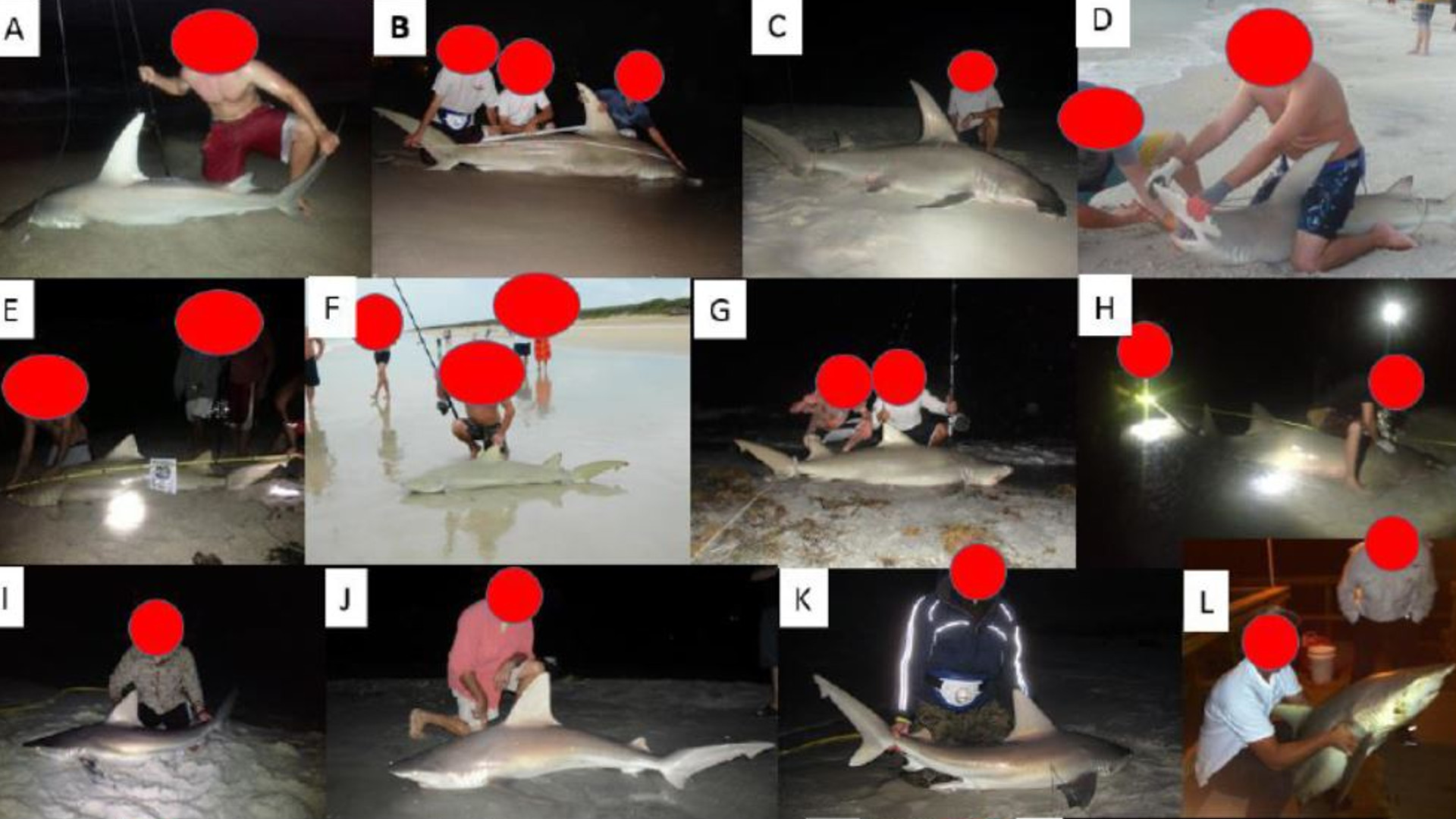Some Florida fishermen are purposefully flouting laws and reeling in endangered sharks, an important new paper reveals.
The illegal activities were uncovered by shark researcher David Shiffman, who studied postings on the online message boards of the South Florida Shark Club, the largest club in the state for fishermen who practice from piers or beaches. Shiffman examined more than 1,250 posts by these land-based anglers and found evidence of people knowingly catching protected species such as lemon sharks (Negaprion breivirostris), sandbar sharks (Carcharhinus plumbeus), tiger sharks (Galeocerdo cuvier), and three hammerhead shark species (Sphyrna lewini, S. mokarran, and S. zygaea). At least 389 sharks were illegally caught, according to his analysis.
“I was somewhat shocked to see all this evidence of illegal fishing, along with so much evidence that some anglers know that it is illegal, right out in the open like this,” says Shiffman, a postdoctoral research fellow at Simon Fraser University.
The study looked at posts between 2010 and 2015. Some of these species gained protection in Florida in 2012, but Shiffman’s analysis found that the new state laws had no effect on the anglers’ practices. Not only did reports of landing these species continue, users posted that they knew what they were doing. “I won’t stop fishing because of this law, and I hope no one else stops either,” one user wrote. “We are outlaws now,” wrote another.
Even worse, the message board posts revealed that certain anglers were even giving each other tips on how to avoid getting caught and punished for their crimes. “Be smart, protect our sport by not naming specific beaches where you plan to fish in order to avoid any further conflicts,” wrote one. “They have to catch you fishing in state waters,” wrote another. One user recommended that people kill state-protected sharks in federal waters outside of Florida state jurisdiction.
The study, published this week in the journal Fisheries Research, comes out just a few weeks after media reports about abusive behavior toward sharks in Florida, including one shocking video of a man dragging a shark behind his speeding boat.
Land-based angling is far less dramatic as that now-notorious video, but Shiffman says it still poses a significant danger for sharks, even if the fishermen are practicing catch-and-release. “Land-based shark fishing has the potential to introduce much more stress to sharks as they are dragged over rough terrain while lacking the buoyant support of water, which means that even if sharks are released, they are less likely to survive if handled this way,” he says.
Shiffman says the research into this problem began because media reports often celebrate anglers bringing in big fish but fail to point out if the catches are protected endangered species. “We learned of this angling club from some of that media coverage and found their online forum shortly after,” he says. “The content on that forum contains years’ worth of useful data for a study like this, and it’s all publicly available.”
Anglers don’t kill as many sharks as commercial fishing, but they still have an effect on the region’s sharks. “There are over 1,000 registered users on this forum,” Shiffman says. “And while they may not represent the same level of threat worldwide as commercial fisheries do, they’re certainly having a significant impact on local population dynamics of threatened and protected species like hammerheads.”
Luckily, the analysis also reveals that the worst attitudes were far from universal among club members. “I was pleased to discover that many of these anglers appear to have a strong conservation ethic and that many are concerned about shark conservation in general,” Shiffman says. “However, they believe that the only problem sharks face is commercial fishing and that their own activities can’t have any impact, which is demonstrably false.” He points out that there are more recreational anglers than commercial fishermen and that they kill more sharks in the U.S. every year than their professional counterparts.
Shiffman says the goal of his paper is to “shine a light on some troubling practices that are currently happening in the shadows.” He says he expects similar activities to be taking place in other popular shark-fishing states such as North Carolina, South Carolina and Texas.
That, he says, shows that we should be paying much more attention to recreational shark fishing than we do now and that anglers need to be made part of the solution. “I think our results show that recreational fishing should get much more research, management and advocacy attention than it currently does. We also showed that there is a significant community of anglers that feels like they don’t have a seat at the table, and that they therefore are less likely to agree with or follow decisions made at that table.”
That’s important, because as Shiffman wrote in his paper, “a detailed understanding of stakeholder motivations can improve communications between policymakers and stakeholders.” Once that communication begins, maybe the illegal fishing will start to decline.
Previously in The Revelator:
Film Fakery: Does Shark Week Harm Conservation Efforts?



I lived in the Tampa Bay area for about 14 months to do some sailing and sailed in both the Gulf of Mexico and the Atlantic Ocean. I met several fishermen on both coasts and in the Keys who made the same claim: the government is harassing recreational fishermen like me, while the commercial fishermen are destroying everything.
While commercial fishing does more damage due to its enormous size, with 7.5 billion people on the Earth your actions are not just yours. Multiply what you do by 7.5 billion, then think about whether it’s OK.
This is also an attitude problem. Sharks, like wolves and bears, are alpha predators, and humans should NEVER kill them for any reason. The fact that people want to kill sharks is the problem, so even the “good” ones in the fishing clubs are badly misguided at best.